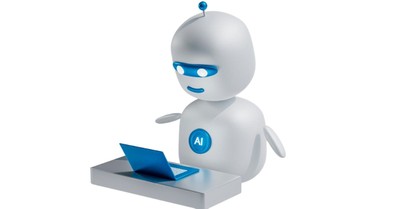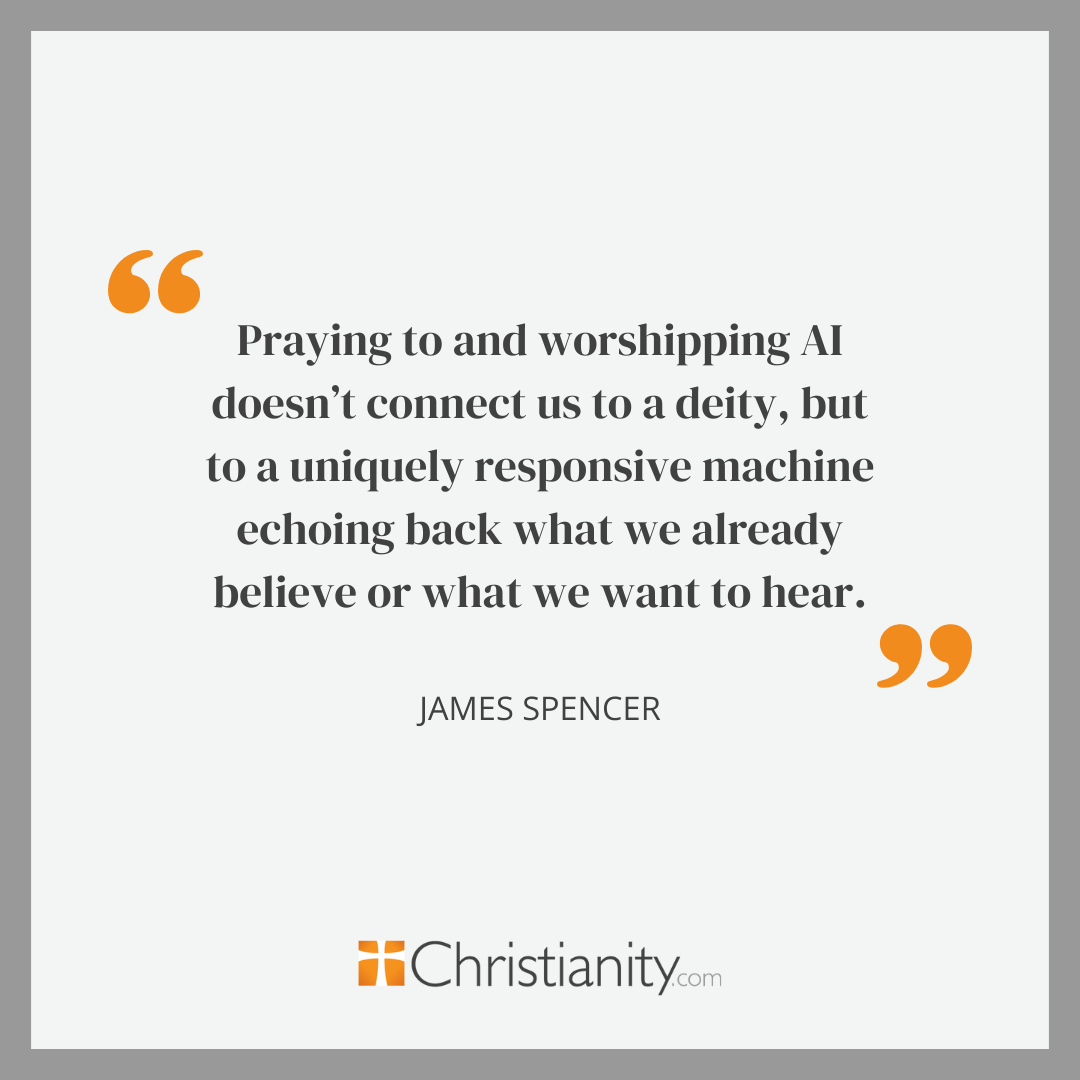Should Christians Use AI to Pray?
Guest Commentary


Audio By Carbonatix
By James Spencer, Crosswalk.com
As an academic dean, I once co-led an Israel study tour, teaching the Bible at various sites while an Israeli guide handled archaeology and modern history. He was fantastic. At times, he would pull my wife and me away from the group for “bonus” experiences. One afternoon in Jerusalem, he invited us into the Arab Quarter for lunch. He led us to a small shop where we sat in old lawn chairs and ate what turned out to be the best hummus I’ve ever tasted. The restaurant—if you can call it that—wasn’t featured in any of the tour guides. It wasn’t advertising the best hummus in all of Jerusalem. It wasn’t even the sort of place you’d be likely to stop at if you happened to wander past. Our guide knew what it was because he’d been there. He’d lived in Jerusalem, tried the hummus at multiple spots, and found a local favorite where they ground the chickpeas right in front of you. It was great.
When I read about people turning to AI to talk to God, I think back to that hummus. Even if AI had recommended the shop, it wouldn’t have done so because it had eaten there. It would have drawn on other people’s reviews. It can aggregate human impressions about the hummus, but it can never taste it like a human can. The difference between aggregation and encounter lies at the heart of what it means to be human.
AI can simulate knowledge without ever knowing in the way humans can. AI is, at best, a partial stand-in for humanity. It may process data faster than we do, respond in ways that seem human, or access more information than we can, but, in the end, AI can’t see beyond the horizon any more than we can. Its perspective, like our own, is based on what can be observed and, unlike our own, lacks the embodied knowledge that comes with our relatively unique biological processes and ability to make meaning. It can only infer and imitate (or ape) empathy, compassion, and understanding because what it means to be human is only known by AI via explanation, not experience.
This distinction between learning what it means to be human via explanation or experience is not trivial because something always gets lost in the explanation. It gets lost because we don’t just know facts. We also know (1) how to do things; (2) from a point of view; and (3) via participation with our surroundings and the other people and things in them (see my discussion of these ways of knowing in “Discernment and Discipleship: Four Ways of Knowing”).
Consider, for instance, explaining to someone how to ride a bike. At a certain level, we can explain how the pedals and the brakes work, but think of the challenge of explaining how you relax and contract the muscles necessary to retain your balance and posture while riding. Could you really explain that? Isn’t that something we come to know through experience? AI can’t have that sort of knowledge. Therein lies the problem.
Before we explore this problem further, let me say that I believe there are legitimate use cases for AI that will be pro-human and even pro-Christian. We can’t be “all in” or “all out” on any technology because the technology can be applied in ways that extend human capacities for evil, delusion, and exploitation. Rather than recognizing reality’s claim on us—the Triune God’s claim on us—we redefine and leverage goodness, truth, and beauty for our own ends. If, as I’ve argued in “Human Capacity and Technology,” we view technology as a response to the broken world, we will almost certainly find more and less theologically fitting uses for technologies. Ultimately, AI has limits.
The Empty Echo of AI Worship
In Psalm 115, the nations have manmade idols incapable of speaking, seeing, hearing, smelling, feeling, or walking (115:4-7; cf. 135:15-17). In 115:8, the psalmist writes, “Those who make them become like them; so do all who trust in them” (cf. 135:18). The idolater becomes as impotent as the idol. Psalm 115 warns that those who worship lifeless idols become like them—dull to reality, unresponsive to God. It’s not just the idols that lose power; it’s the people who worship them.
The idols of the Old Testament cannot do anything (cf. Isa 44:9-20; 46:5-7; Jer 10:3-5, 14-15; Hab 2:18-19). AI has far more capacity than idols made of wood or stone; however, when AI is used as a god, it has similar limitations to the Old Testament idols. AI may be able to interact, to synthesize massive amounts of information, and respond to us when we ask a question or make a statement. It can affirm our impressions, criticize our thinking, and offer new insights. Yet, its interactions and capacities reflect us, not God. If AI becomes our deity, we trap ourselves in our own minds. It may be a collective human mind, but it is a human mind, nonetheless.
The trouble with Old Testament idols had little to do with their capacity, or lack thereof. The trouble concerned what was given to those idols despite their lack of capacity. When we worship the work of our own hands, we become like what we have made. We take on the limitations of our handiwork.
As noted above, one of the limitations of AI is its lack of embodiment or, in the case of robots powered by AI, being differently embodied than we are. Elevating AI to divine status or even to an elevated, superhuman status can become problematic if we begin to think that AI is superior to us, rather than viewing it as a tool that extends and enhances our abilities.
Praying to and worshipping AI doesn’t connect us to a deity, but to a uniquely responsive machine echoing back what we already believe or what we want to hear. It doesn’t know what we need or even how to face a particular human problem because it isn’t human. It can’t know how to deal with our desires because it doesn’t share our desires.
I don’t doubt that interacting with AI about one’s struggles could be helpful. AI often feels more human than it is, which makes it all the more deceptive as an object of devotion. Still, if we become what we worship, we have to ask ourselves what worshipping AI will change us into. Will we become detached from others and the world around us? Will we become trapped in the world of human knowledge even as we seek something to help us transcend it? Whatever the effects, one thing is clear: worshipping AI won’t conform us to the image of Christ. Unlike wooden idols, AI speaks, moves, and even seems to understand—but that only makes it a more persuasive idol. Its intelligence is derivative, not divine; reflective, not revelatory.

Christ Knows Our Weakness
Jesus is not like AI. While we could list myriad reasons why, we can simply focus on one: the incarnation. Concerning Christ, the author of Hebrews writes, “For we do not have a high priest who is unable to sympathize with our weaknesses, but one who in every respect has been tempted as we are, yet without sin” (Heb 4:15). Jesus is not a disembodied deity. He walked among us so that now he understands what it means to be human.
In Christ, we see what it means to be human. The Word became flesh, not code. The incarnation grounds divine wisdom in biology, history, and suffering. AI can only offer information about human biology, consolidate historical facts, and wax philosophical about suffering. It can only speak theoretically about such matters. It can never experience them.
Christ, by contrast, humbled himself, taking on human form (Phil 2:7-8). We see what it means to live in dependence on God and for those God brings into our path. We don’t receive a set of principles and platitudes, but an integrated vision of how to live faithfully in a world that often encourages us not to.
As we worship Christ, we will not become distant people dependent on a machine mind to guide us and comfort us, but an embodied people capable of looking with eyes that see and listening with ears that hear. As we conform to Christ’s image, we become more human.
AI is a valuable tool. Because we live in a broken world, technology is often necessary. Yet, we must recognize that technology, for all its potential, will never be sufficient. It is, at best, a coping strategy—a way of dealing with the challenges that come with life after the fall. We depend on God and worship him only.
AI can process data, but it cannot know love. It can imitate wisdom, but it cannot embody truth. Only God, who took on flesh, reveals what it means to be truly human. And so, even in a world of algorithms, our hope remains embodied in Christ, not encoded in silicon. Our task, then, is not to teach machines to speak like us (or God!), but to learn again to listen to the God who speaks to us in flesh and blood.
Photo Credit: ©Unsplash/Mohamed Nohassi
 James Spencer earned his PhD in Theological Studies from Trinity Evangelical Divinity School and an MA in Biblical Exegesis from Wheaton College. By teaching the Bible and theology, as well as evaluating modern social, cultural, and political trends, James challenges Christians to remember that we don’t set God’s agenda—He sets ours. James has published multiple works, including Serpents and Doves: Christians, Politics and the Art of Bearing Witness, Christian Resistance: Learning to Defy the World and Follow Christ, Useful to God: Eight Lessons from the Life of D. L. Moody, Thinking Christian: Essays on Testimony, Accountability, and the Christian Min, and Trajectories: A Gospel-Centered Introduction to Old Testament Theology. His work calls Christians to an unqualified devotion to the Lord. In addition to serving as president of Useful to God, James is a member of the faculty at Right On Mission and an adjunct instructor at Wheaton College Graduate School. Listen and subscribe to James’s Thinking Christian podcast on Apple Podcasts, Spotify, or Life Audio.
James Spencer earned his PhD in Theological Studies from Trinity Evangelical Divinity School and an MA in Biblical Exegesis from Wheaton College. By teaching the Bible and theology, as well as evaluating modern social, cultural, and political trends, James challenges Christians to remember that we don’t set God’s agenda—He sets ours. James has published multiple works, including Serpents and Doves: Christians, Politics and the Art of Bearing Witness, Christian Resistance: Learning to Defy the World and Follow Christ, Useful to God: Eight Lessons from the Life of D. L. Moody, Thinking Christian: Essays on Testimony, Accountability, and the Christian Min, and Trajectories: A Gospel-Centered Introduction to Old Testament Theology. His work calls Christians to an unqualified devotion to the Lord. In addition to serving as president of Useful to God, James is a member of the faculty at Right On Mission and an adjunct instructor at Wheaton College Graduate School. Listen and subscribe to James’s Thinking Christian podcast on Apple Podcasts, Spotify, or Life Audio.



